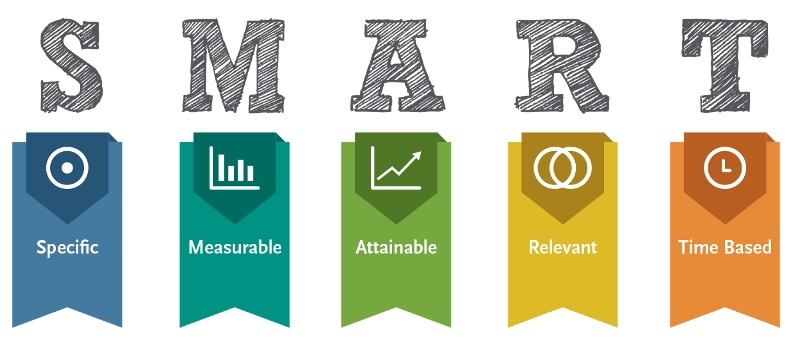
|
Each January, many people spend time thinking about new goals for their year and life. Actually, there is nothing magic about doing that in January only. As author Gretchen Rubin writes, the best time to start a new habit–or break a bad habit–is not the first day of the week, or the month, or the year, but right now. Still, many people do think about goals at the new year, and here are some points I heard from talk radio personality and financial guru Dave Ramsey on his January 4, 2016 program. Ramsey himself said he had heard these points from Zig Ziglar, famous motivational speaker. Creating goals has 5 crucial elements. To help you be successful, your idea must be:
1. Specific. (If not, your idea is just a wish or a daydream.) For example, saying “I want to be in shape” or “I want to improve my grades” is vague. By the end of the year, it is hard to know if you have reached that goal or not. Specific versions of these goals are: “I want to be able to run a 7-minute mile,” “I want to be able to finish a 5 kilometer hike in the mountains,” or “I will have all A’s or B’s this semester.” 2. Measurable. This is related to being specific, because we need goals to be something we can measure. Let’s take the goal of health again. To say “I want to work out,” is too vague and weak. Saying “I want to work out at the gym” is specific, but it’s still not good enough. A measurable goal is, “I am going to work out at the gym, at least 3 times a week, for at least 50 minutes each time.” This is not a wish, but a specific, measurable goal. By each Saturday night, you can look back on your week and know if you met your goal or not. 3. Your goal/Attainable. When you think about the goal, is it truly something you believe in? In other words, are you working for something because your friends, parents, or spouse wants you to do? To be increase your chance of attaining it, be sure it is something that is meaningful to you. For example, I have a friend who is a licensed attorney. She was successful at it for years, but she told me she went into law because her father suggested she do it. Later in her career, she stopped being a lawyer and became–get this–a public high school English teacher. Why? it was what she wanted to do, and she found her bliss. 4. Time-specific. Here too, an idea without a time limit is only a wish or a daydream. What’s wrong with this thinking? – One of these days I’ll get in shape. – One of these days I’ll have a happy family. – One of these days I’ll get organized. The problem is, they have no time-frame. Putting a deadline on the objective is a crucial step from turning a wish into a goal. Now, see how a time-frame changes these: – I will be able to lift 30 kg (44 lbs.) by the end of the month. – I will take my family on an overnight trip within two weeks. – I will clear my desk off by 5:00 each day. These are time-specific goals. Writing 5. In writing. This is what Ramsey calls the “magic” of goal-setting. It’s easy to have positive ideas in our minds, but when we take the time and effort to write them down–whether on a computer or paper–then we take our thinking to the next level. For one thing, it takes time and effort to write down our ideas, so that can convince even ourselves that we are serious about it. Plus, when ideas are only in our mind, they can be vague and “fuzzy.” But writing has a way of clarifying and crystallizing our thoughts, thus making them easier to evaluate and implement. Further, when goals are on paper, we can share them with a loved one and ask for help with accountability, as well as have a clear “check list” where we can record our progress. Ramsey quoted the Bible verse Habakkuk 2:2.
“Then the LORD answered me, Write the vision. Make it clear on tablets. so that anyone can read it quickly.” (God’s Word translation) 耶和华对我说:“将我的启示记下来,清楚地刻在版上,便于人们阅读。–哈巴谷书 2:2 Another way to express this is to call your goals SMART goals. SMART is an acronym for objectives that are: Specific, Meaningful (for you), Action-oriented/Attainable, Realistic, and Timely. See the image here.
Learn more about S.M.A.R.T. goals and get a FREE worksheet to use for your own goals, here, from the Dave Ramsey team!
Want to see a personalized video that business consultant Mr. Zach Clark, CEO of Development and Leadership Coaching, made for Scott in March 2018 on the topics of focus, goal-setting, planning, and follow-up? Watch it here! *********************** A word about ANOTHER crucial part of goal-setting success Let me close with a little story. Someone close to me has been working part-time for years, but never seemed able to save much money. At the end of each year, this person would get a statement showing how much money had been earned and reported for taxes, yet the bank account was always low–and so this individual would wonder: “How come I’ve been working so hard for so long, but I don’t have anything to show for it? Now matter how much I earn, I spend it all!” So one day in early summer, out of the blue, this person asked my wife and me: “Would you be my accountability partners?” This individual went on to explain: “I know myself very well– if I have money in my bank account, I’ll spend it, thinking ‘it’s okay, I’ve got lots of money.’ So, I end up living paycheck to paycheck, but I really want to save some money this summer.” So, the three of us got out a pen and paper, and I advised: WRITE DOWN THE SPECIFIC GOAL. “I will save US$1,200 by August 9, (before school starts), and I will do this by giving Deborah and Scott $350 each paycheck.” This young person then put the paper on a place to see daily. My wife agreed to take the cash each paycheck and put it in an online bank. That way, the money is “gone” so this person cannot spend it, PLUS the amount earns some interest! Furthermore, this individual used to eat out a lot, but has now greatly reduced that habit and instead packs lunches–that alone has helped save lots of money. Since this person asked me to be an accountability partner, it’s my job to gently remind every two weeks: “Your $350 is due on Thursday.” I am NOT nagging– I am just doing my job, because this person ASKED for my help, so to NOT follow up would be negligence on my part. I am delighted to report, this person has not only made the $350 investment each pay period, but this person sometimes saves OVER that amount! So, at this point, this individual is on track to SURPASS the $1,200 goal! Just last night this person told me, “When I started, I didn’t really think I could do it, so I’m so happy now to see I’m on track. Now, I want to save $5,000 by the end of the year.” My response: “It’s amazing what we can all do, if we just set our mind to it.” The details will depend on your own personality and situation: would an accountabilty partner help you achieve your goals? ********************************* Here’s to your success! If your goals include “improving my English,” “being able to talk with foreigners,” “going to high school or college in the US or an English-speaking country,” “doing well on the SAT and TOEFL,” or “improving my career,” we can help you! At DreyerCoaching.com, we have English classes for children to adult, plus we help with writing and editing as well as US high school or college placement. When it comes to following your goal or dream, you are not alone. We can help you! Zig Ziglar on Setting Goals. (Note: Zig Ziglar [1926-2012] was America’s premier motivational speaker. I had the privilege of hearing him the last time he toured the Roanoke Valley of Virginia. This speech is of great value, but it is a challenging listening exercise because 1. he speaks quickly–often hundreds of words per minute, and 2. he was born in Mississippi, so he has a strong “Deep South” accent.)
|

